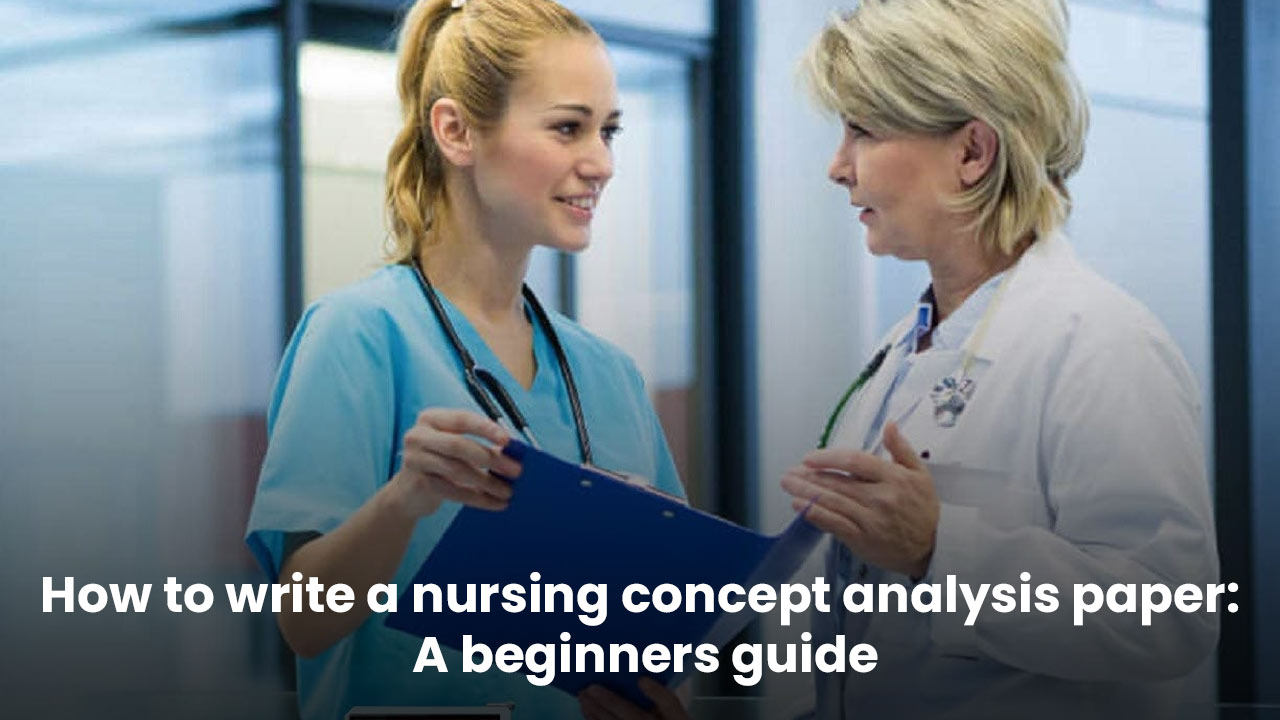How to write a nursing concept analysis paper: A beginner’s guide

Contents
- Introduction
- What is a concept analysis paper in Nursing?
- Uses of concept analysis paper
- Nine steps for writing a concept analysis paper
- Select a concept
- Determine the purpose of the analysis
- Explore or discover all the uses of the concept
- Conduct a Literature Review
- Identify the characteristics of the concept
- Identify the model case
- Identify the alternative/additional cases
- Identify the pre-existing and by-products
- Describe the empirical referents of the concept
- Conclusion
Introduction
As a nursing student, a time comes when universities are assigned a concept analysis paper or nursing assignment. While it is a challenging paper for all students, they will enjoy writing it if they do well. This blog will explore how students can write a concept analysis paper.
What is a concept analysis paper in Nursing?
Before we learn about concept analysis papers, let's define a concept. The basic definition of concepts is that they are basic blocks of the theory construction process of the paper. Concepts have defining attributes or characteristics that differentiate them from other concepts. Concept analysis refers to the academic structure and function of a concept. It is a formal, rigorous, and specific linguistic exercise used to decide the defining attributes of a concept. So In a nursing concept analysis paper, students have to select a concept, define its characteristics, build a theory around it and give final opinions on the concept. In a concept analysis paper, students must examine, evaluate/deconstruct the essential elements that make up a concept.
Uses of concept analysis paper
After learning about what is a concept analysis paper. The following will explain its uses
- Differentiate an idea from similar ideas.
- It defines the internal structure of a notion.
- Clarifying overused, vague, or complicated concepts in nursing practice for consistency in interpretation.
- Construct measurement tools, research instruments, and interview guides before the actual research.
- Use nursing terms that have the perfect meaning of the phrases.
Nine steps for writing a concept analysis paper
1.Select a concept
Nursing students must cautiously choose a concept. Selecting an idea that students are interested in or associated with their work is crucial. During concept selection, reflect on the area of topic interest, its boundaries, and context. The process is called concept isolation. Select an impactful topic. They should choose a concept, i.e., essential in the next step of their research. Students must select a manageable concept topic. During the topic selection process, they should avoid primitive terms. Students must focus on an essential concept in nursing. Lastly, they should consult their professor or instructor when selecting a concept topic for writing the paper.
2.Determine the purpose of the analysis
In most cases, students will determine the analysis purpose through the assignment prompt in the nursing class. This step helps the students to know the point of focus and what to expect. Students can ask themselves what's the reason for writing an analysis paper.
Every student must comprehend the reason why they got concept analysis. This process will help students to build the defining attributes and discover the uses of the concept. They also differentiate between the ordinary language and the scientific language usage of the concept. Finally, students can create introductory definitions, research instruments, and strategies or add an existing theory.
3.Explore or discover all the uses of the concept
Students can use dictionaries, available literature concepts, and thesaurus to identify all uses for their selected concept. Students should be open to the aspect of the concept. Instead of searching for every dimension of the idea, they should consider its implicit or explicit uses. Students will explore their research and read many sources widely in this section.
4.Conduct a Literature Review
After exploring the uses of the concept, students should review literature that helps them support or validate their ultimate choice of defining attributes. It also helps to offer evidence related to concept analysis. For instance, if students are talking about coping, use in psychology, mental health, and other uses outside the selected area. A literature review is related directly to nursing research paper writing, or it can also combine knowledge or evidence from different fields.
5.Identify the characteristics of the concept
In this step, students should identify the vital elements of the defining attributes of their chosen concept. Then, students can portray a cluster of associated features with the concept. Students can take notes on the characteristics frequently appearing in the concept analysis paper. Defining attributes is the criteria for defining what a concept means and doesn't mean.
6.Identify the model case
Nursing students use cases to construct their analysis. Here's a model case is an example of the uses or application of a concept and a way to demonstrate the defining attributes of the concept. It must contain the key characteristics of the concept, the defining criteria, and at least one of the antecedents and consequences.
Nursing model cases help students understand the concept of nursing, yet sometimes they can obscure their objectivity about its meaning. But also, remember that some concepts are easier to develop in a case compared to others.
The model case can come first during their analysis if students are familiar with a concept. They must be sure about the concept instances. They can also compare their experience to the defining attributes of the concept.
7.Identify the alternative/additional cases
When constructing their concept analysis model, students must evaluate other cases. Be careful while teasing out the defining attributes and closely representing them with the challenging concept as they overlap with some related concepts.
Evaluating cases that are not similar to the concept but somewhat related to it will help students to make a better judgment for defining characteristics that best fit. When students identify additional or alternative cases, it enables them to decide on a defining attribute for their concept. The possibilities are borderline, related, invented, contrary, etc.
8.Identify the pre-existing and by-products
Students must move to antecedents or consequences after identifying the alternative cases of the concepts. Students lose grades because they ignore these steps. Students will get valuable insight into the social context of the concept through antecedents or consequences. Antecedents are the incident that defines the incidents that happened before the occurrence of the concept, so they can't define the attributes of the concept. Consequences are the events that happen after the occurrence of the concept, or it is the outcome of the concept.
9.Describe the empirical referents of the concept
In the last step, students have to give observed meaning to define attributes during concept analysis writing. Here students can measure the real-life use of the concept. Empirical referents are the categories or classes of actual phenomena that demonstrate the occurrence of a concept. Generally, defining attributes and empirical referents are similar. But in the case of the concept and its attributes, students have to define their empirical referents. Empirical referents can't measure the concept but can measure or recognize defining attributes. They can help create the instrument as the theory of the concept is closely linked to empirical referents. So, empirical referents contribute to the development and validation of the instruments. They also help students get the clear and observable phenomenon that defines the concept's existence with patients.

Conclusion
We conclude that students can select their concept topic and evaluate the process of writing a concept paper. They follow the above steps for writing their concept analysis paper. From this, they can quickly write a concept analysis paper, essay, journal article, etc. Students can take help from a renowned platform that provides nursing assignment help if they are stuck with the concepts. Each move is essential for students because it can affect their academics and careers. So they should be vigilant during it.
Leave a Reply
Your email address will not be published. Required fields are marked *






